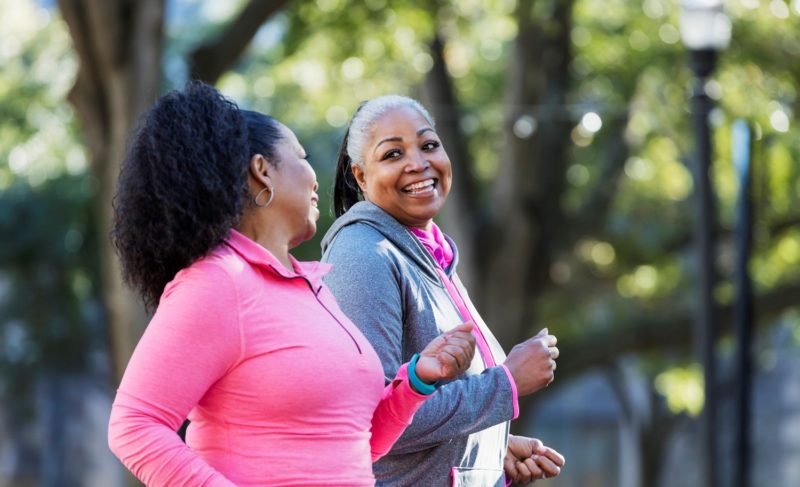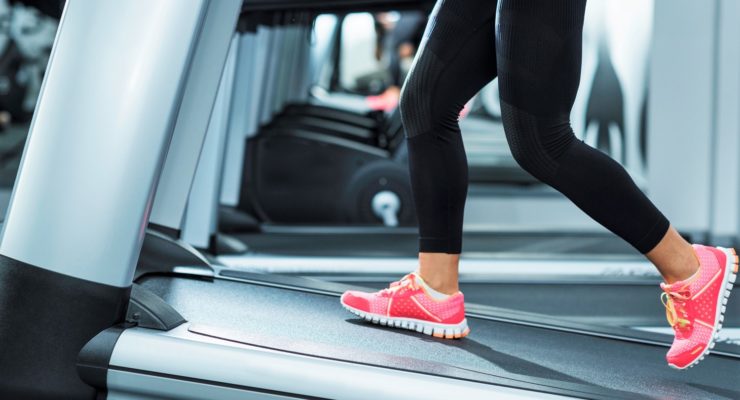Walking vs. Running: Which is Better for Weight Loss?
Article posted in: Fitness
If you’re trying to lose weight, you might feel like you have to start running. It’s the way seemingly everybody gets fit … or tries to: In a survey from 2017, 60 million Americans were running for fitness, and 80 percent said their reason to continue doing so was to stay healthy.
And exercise is invaluable to your health: The Centers for Disease Control and Prevention recommends that Americans get 150 minutes of exercise per week to reduce their risk of cardiovascular disease, diabetes, osteoporosis and premature death. Even with all those benefits, almost 80 percent of Americans don’t hit that 150-minute mark.
To reach those weekly minutes—and add to your weekly calorie burn, increasing your overall weight loss—you could run, but you could also slow things down and walk. So … which is better? Should you walk or run for weight loss?
Factor 1: Which one burns more calories?


For calories per minute, jogging beats walking: According to the American Council on Exercise, a 180-pound person will burn 13.9 calories per minute while jogging, compared with 9.7 calories per minute while walking. So if this 180-pound person exercised for 20 minutes, they’d burn 278 calories. A walk of the same time would burn 194 calories.
You can catch up by walking for longer: By walking just nine more minutes, our 180-pound person would burn more calories than they did on the 20-minute jog. For many dieters, 30 minutes of walking is easier than 20 minutes of jogging.
The calorie burn of both running and walking can get a boost if you vary your tempo during your workout: Interval training or HIIT, where short bursts of higher-intensity work are alternated with easier work, has been shown in multiple studies to burn more fat and increase heart function better than medium-paced, steady-state cardio work.
Whether you’re running or walking, try alternating one minute of slightly harder efforts with one minute of easier efforts. In one study, when scientists had walkers increase their pace by as little as five inches per second for one-minute bouts, the walkers burned 20 percent more calories than when they walked the same pace throughout their walk.
No matter which of the two activities you do for burning calories, make sure you’re not eating them all back and more once you get home: Runners often anecdotally gain weight while training for big races because big runs give them bigger appetites. They also overestimate how many calories they’ve burned: One study found that after a moderate-intensity run, people overestimated how many calories they burned by 300 to 400 percent! In another study, that type of overestimation led runners to eat 20 percent more calories in a post-run meal than they’d burned on the run.
Your Solution: The NuMi app. It’s the free Nutrisystem app that will not only help you determine how many calories you’re actually burning during exercise, but can also help you find post-run or -walk snacks that fit into your daily plan.
Factor 2: Which one will help me lose weight faster?


According to one huge study, it depends on if you’re a man or woman, and how much weight you have to lose. In the study of 50,000 people, men lost significantly more weight from running than walking, as did women who were in the top “quartile” of BMI—those who had the most pounds to lose.
But for women in virtually every other category, walking was just as effective for weight loss as running was. For both men and women in the highest starting weight categories, walking led to about half the weight loss benefit that running did—meaning running was more effective but walking was still very effective, too.
And for people in those high-starting-weight groups on down, that can be more sustainable: Up to 79 percent of runners are sidelined by an injury at least once per year. And if you’re injured, you can’t get the weight loss benefits of the exercise. So walking could be a safer long-term bet.
Factor 3: Which one burns more belly fat?


You might think this one’s a no-brainer: It’s running, right?
Not so fast—literally. While high-intensity training can burn more body fat overall, low-intensity exercise, like walking, is more effective in specifically targeting belly fat. It makes sense that walking burns fat, too: Slow-twitch muscle fibers, which you use for lower-intensity, endurance movements like walking, use fat for fuel.
“Submaximal” exercise, performed at about 60 percent of your maximum effort, may be the most fat-burning of them all. In one study, people who performed this “submaximal” cardio were able to reduce fat in their butt and legs even when scientists were injecting estrogen into those body parts, a process that usually triggers fat gains.
Whether you choose to walk or run to fight fat, adding strength training is a powerful partner to your cardio moves: In one study, men who did 20 minutes of daily weight training had lower levels of age-related fat gains compared to guys who did the same amount of cardio work.
So mix it in! Take a walk or run break halfway through and do a set or two of lunges, bodyweight squats, pushups or step ups onto a bench. The muscle-building you’ll get will help boost your fat burn.
Enough beating around the bush! Which is better, running or walking?


The real answer depends on you: Whichever one you’re more likely to stick to is the exercise type that’s best for your weight loss goals. Studies show that about 50 percent of exercise program participants drop out in the first six months.
What makes people stick to their programs? A big factor is doing something they enjoy, or as scientists put it, “anticipated positive feelings” associated with physical activity makes you more likely to do it. So if running sounds good to you, and you can hoof it without getting hurt—that’s great! If walking sounds better, that’s great, too.
You’re more likely to stick to an exercise style you’ll enjoy, and there’s a bonus: Enjoyment also leads to enhanced results. So which one is better? You decide!










